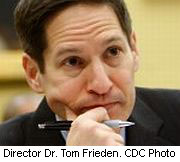
THURSDAY, Oct. 16, 2014 (HealthDay News) — In the face of blistering criticism from a Congressional oversight committee, top U.S. health officials defended on Thursday their opposition to a ban on travelers from West African nations fighting Ebola.
Legislators also asked tough questions about health officials’ response to the first case of Ebola diagnosed in America, particularly since two intensive-care nurses who cared for that first patient later contracted Ebola themselves.
Hearing chairman Rep. Tim Murphy, R-Pa., grilled federal health officials about infected nurse Amber Joy Vinson, who flew on a plane from Cleveland to Dallas on Monday evening even though she had told the U.S. Centers for Disease Control and Prevention that her temperature was elevated.
Within hours after stepping off the plane, Vinson was in isolation at Texas Health Presbyterian Hospital in Dallas, awaiting an Ebola test that would prove positive.
“Mistakes have been made,” said Murphy, who chairs the House Energy and Commerce Subcommittee on Oversight and Investigations. “Trust and credibility of the administration and government are waning. That trust must be restored.”
Health officials have decided to move both Vinson and an infected colleague, Nina Pham, from Texas Health Presbyterian Hospital to other facilities in the United States with dedicated biocontainment units designed to treat deadly infectious diseases like Ebola.
Vinson already has been relocated to Emory University Hospital in Atlanta, which has successfully treated two other patients with Ebola. Efforts are under way to move Pham to a specialized National Institutes of Health medical center in Bethesda, Md.
Vinson and Pham contracted Ebola while caring for Liberian national Thomas Eric Duncan, who died Oct. 8. They are being moved, in part, to ease the burden on Texas Health Presbyterian, which has its hands full tracking dozens of other health care workers who may have been exposed to Ebola while treating Duncan, said Dr. Tom Frieden, director of the Centers for Disease Control and Prevention.
“Texas Presbyterian is dealing with a difficult situation,” Frieden said at the hearing. “They are now dealing with at least 50 health care workers who may potentially have been exposed. That makes it quite challenging to operate, and we felt it would be more prudent to focus on caring for any patients who come in with symptoms.”
In response to lawmakers’ demands for a travel ban, Frieden said that keeping commercial air travel open with Guinea, Liberia and Sierra Leone — the epicenter of West Africa’s Ebola epidemic — will continue to strengthen efforts on the ground to contain the outbreak.
At the same time, new entry screening protocols at five key U.S. airports will help federal officials better track the 150 travelers a day who come to America from one of the three nations, Frieden said.
Under a ban, people in the three West African countries would be tempted to slip across the border into a neighboring nation and fly to America from there, making it difficult or impossible to detect their entry into the United States, Frieden said.
“We won’t be able to check them for fever when they leave,” he said. “We won’t be able to check them for fever when they arrive. We won’t be able to take a detailed history to see if they were exposed. When they arrive, we wouldn’t be able to impose quarantine as we now can if they have high-risk contact.”
Other officials on the panel supported Frieden’s position. They included Dr. Anthony Fauci, director of the U.S. National Institute of Allergy and Infectious Diseases, and John Wagner, acting assistant commissioner for the Department of Homeland Security’s customs and border protection field operations.
This united front did not blunt legislators’ demands for a travel ban.
“I just don’t understand [how] we can’t look at one’s travel history and say, ‘No, you’re not coming here, not until this situation’ — you’re right it needs to be solved in Africa, but until it is we should not be allowing these folks in. Period,” said Fred Upton, R-Mich., chairman of the House Energy and Commerce Committee.
Also Thursday, the World Health Organization said that the chances of a full-on Ebola outbreak in the United States or western Europe remain unlikely, given the public health systems in place, according to BBC News.
“We’re confident that in North America and western Europe, where health systems are very strong, that we’re unlikely to see a major outbreak in any of those places,” said Christopher Dye, the WHO’s director of strategy.
At Thursday’s Congressional hearing, a top official with the hospital chain that operates Texas Health Presbyterian admitted that “we made mistakes” in Duncan’s care.
“We did not correctly diagnose his symptoms as those of Ebola,” said Dr. Daniel Varga, chief clinical officer and senior executive vice president for Texas Health Resources. “We are deeply sorry.”
Duncan appeared at the hospital’s emergency room on Sept. 25 with a fever that spiked to 103 degrees, abdominal pain, dizziness, nausea and headache, Varga said. He underwent numerous tests during a four-hour period. But doctors decided to release him — even though both federal and local health officials for months had been providing the hospital with information regarding potential Ebola patients.
An ambulance brought Duncan back to the hospital on Sept. 28. On that visit, doctors quickly assessed him as a potential Ebola patient, placed him in isolation and contacted the CDC, Varga said.
Vinson and Pham are believed to have contracted Ebola from Duncan while treating him in the hospital’s intensive-care unit, during the period between his admission and his diagnosis with Ebola on Sept. 30, Frieden said.
During that period, both nurses wore full protective equipment, Varga testified.
Officials still have not determined how the two nurses became infected with the Ebola virus. But Frieden reassured lawmakers Thursday that the strain of Ebola Zaire involved in this epidemic has not mutated into a more communicable strain.
“We are confident this is not airborne transmission,” he said. “These nurses were working very hard. They were working with a patient who was very ill, who was having lots of vomiting, lots of diarrhea. There was a lot of infectious material.”
More information
For more on Ebola, visit the World Health Organization.
Copyright © 2026 HealthDay. All rights reserved.

